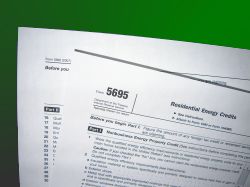A Solar Energy Tax Credit For Homeowners
The Federal solar energy tax credit is one of many solar energy incentives.
 IRS Solar Energy Tax Credit Form
IRS Solar Energy Tax Credit FormA solar tax credit is a financial incentive given by Federal and state governments to help make solar energy more affordable for homeowners.
Keep in mind that a tax credit is better than a tax deduction.
With a tax credit, you reduce your taxes dollar-for-dollar of the amount claimed, whereas with a tax deduction, you only reduce your taxes by a percentage of the amount claimed.
Federal Renewable Energy Tax Credit
In the United States, the Federal government offers a solar energy tax credit for the following solar technologies...
- Solar Water Heating
- Photovoltaics
- Other Solar Electric Technologies
Up to 30% of the cost of the system can be claimed by the taxpayer up to the following maximum amounts...
- Solar Water Heating: $2000 prior to 12/31/2008; No limit starting 1/1/2009
- Solar Electric (including Photovoltaics): $2000 prior to 12/31/2008; No limit starting 1/1/2009
This credit is available for systems placed in service from January 1, 2006, thru December 31, 2016. You can claim this tax credit using IRS Form 5695, Residential Energy Credits.
In addition to the Federal Renewable Energy Tax Credit, many states offer a tax credit for solar power that you may be eligible for
State Solar Energy Tax Credits
In addition to the Federal Renewable Energy Tax Credit, many states also offer solar energy tax credits. These credits can be used in addition to the Federal credits.
The technologies eligible for state tax credits for solar energy include...
- Photovoltaics
- Solar Water Heating
- Solar Space Heating
- Passive Solar Space Heating
- Solar Pool Heating
- Solar Cooling
- Daylighting
You can find out if your state offers a solar energy tax credit and which solar technologies are eligible by searching the Database of State Incentives for Renewables and Efficiency (DSIRE).
DSIRE provides free information about renewable energy and energy efficiency incentives administered by federal and state agencies, utilities, and local organizations. Take a look at the DSIRE solar incentives database for more info.
Home > Cost of Solar Energy > Solar Energy Tax Credit



